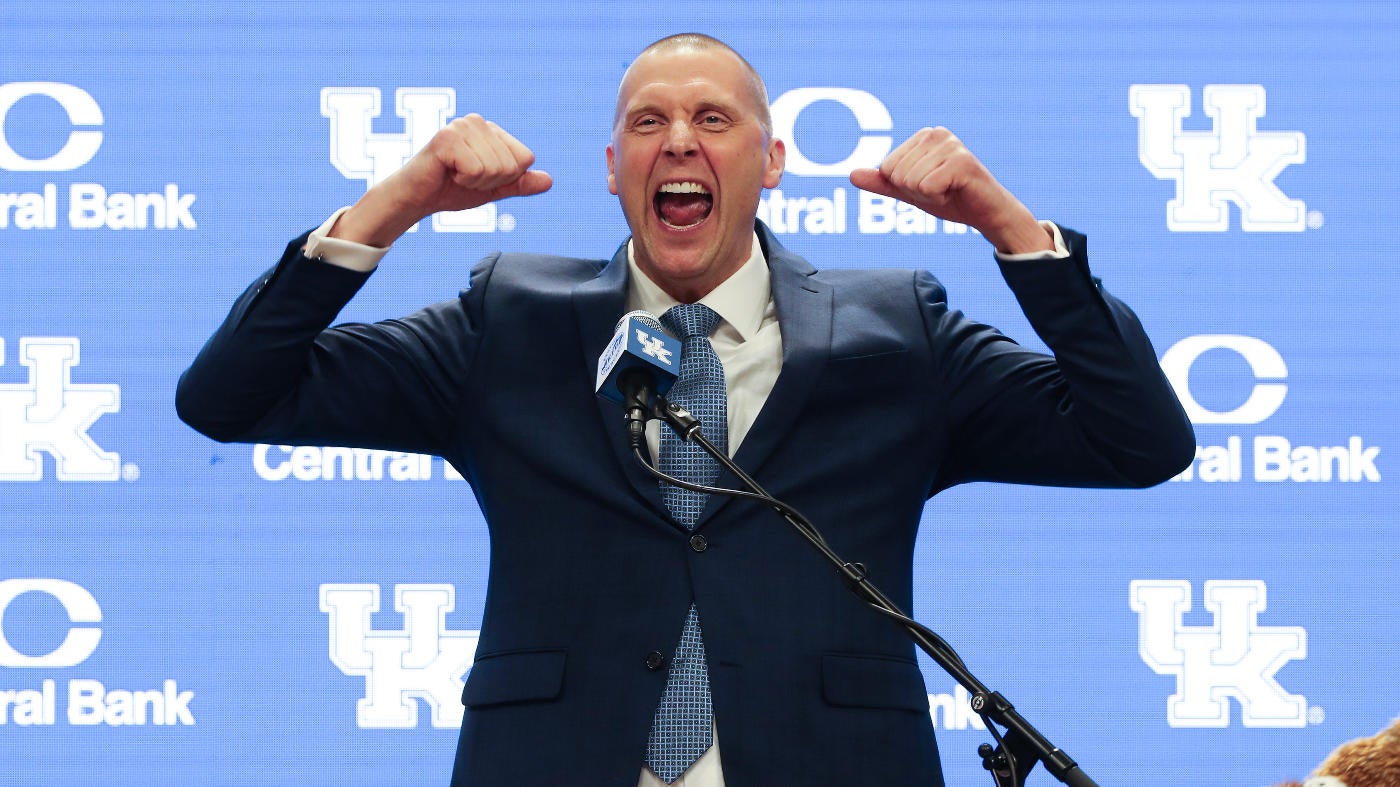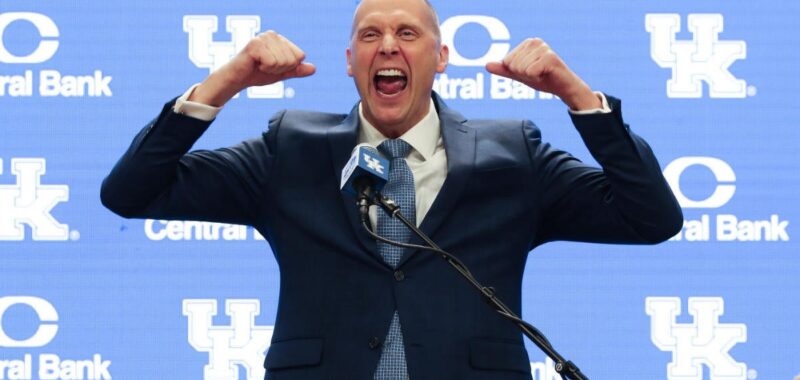
In the days and months since UConn (again!) cut down the nets and hoisted its second consecutive national championship trophy in as many years, this last one from Glendale, Arizona, college basketball’s gears have grinded nearly nonstop with a churn of drama mixed with coaching searches and NIL developments.
The sport never sleeps – not even in May, Jon Rothstein! – but you’d be forgiven if you haven’t kept up with every relevant (and possibly less relevant) development in between.
That’s why we’re here.
But as the calendar has flipped to September and the season fast approaches – the fall semester has already started and hoops will happen in ~two months – it’s time now to get up to date on some of the biggest developments of the offseason and shake out who came out of the dust as the winners and losers from it all.
Let’s do it – and we’ll start here with the Bluegrass State, which on its own delivered enough fireworks to take up multiple spaces below.
Losers: Blues in the Bluegrass State
John Calipari’s stunning decision to leave Kentucky for Arkansas was effectively the first real news of the offseason. Calipari’s move didn’t necessarily come as a surprise, and truth be told, it seemed like a change was needed both for him and the UK program. But any time you lose a coach with a Hall of Fame resume it’s hard to see it as anything other than a loss.
That set up the state – both Louisville and Kentucky, which both opened – to be universally rejected by Baylor coach Scott Drew in a span of weeks. Drew was pursued hard by both schools but ultimately decided to stay with the Bears, spurning two other major programs in the Bluegrass State with tremendous resources and a commitment to winning.
Both programs seem to have rebounded well after the rejections – we’ll get to those in a bit – but Drew stiff-arming Louisville and Kentucky was a surprising turn of events that said a lot about the state of college athletics and the state of basketball in Kentucky at the moment.
Winner: Happy Hour for Mi Casita in Waco
In the midst of Kentucky’s pursuit of Drew, he took to Twitter to share a photo of he and a friend breaking bread at Mi Casita in Waco, Texas. The picture went viral and confirmed he was not in Lexington, Kentucky, but instead in Waco, and internet sleuths dug up the restaurant – which subsequently received positive reviews online flooded with messages hoping Drew would either stay in Waco from Baylor fans or leave Waco for Lexington from Kentucky fans.
What a world.
Mi Casita went so viral and got so much positive exposure from the incident that it memorialized the moment by placing a plaque inside the booth labeled “Drew’s table.” Drew later went back and placed his John Hancock in the booth.
Loser: Parity in the Big 12
If you were holding your breath that the additions of Arizona, Arizona State, Colorado and Utah into the Big 12 might shake up the league in 2024-25 — then you may run out of oxygen in a hurry this season. The former Pac-12 schools should add some intrigue in the league in their first year, but it’s unlikely we crown a new champion in 2024-25, is my guess. That’s because Kansas — likely the preseason No. 1 team in college hoops — brings back Hunter Dickinson and added Zeke Mayo, among others. That’s also because Houston — also a preseason No. 1 candidate — returns eight of its top 10 scorers from last season. Kansas has won or shared the conference title all but three times since 2005 (Houston being responsible for one of those instances, winning the Big 12 last year), and I’d be surprised if either Kansas or Houston doesn’t take down the Big 12 in 2024-25 given what the two teams return.
Winner: Mark Pope returns home
The University of Kentucky didn’t get its top target during its coaching search but Mark Pope – an alum who had a nice run at BYU – seems to have fit right in with the Wildcats and established some momentum taking the baton from Calipari. Pope flipped the roster with a transfer-heavy class that should have his team ready to compete for an SEC title in Year 1, and to boot, he’s been received well in Lexington, Kentucky, owing in part to his role in UK’s national title in 1996 and to his affable personality.
Winner: Dan Hurley enters superstar territory
After leading UConn to its second consecutive national championship, Hurley crossed over from well-known college coach to superstar household name this summer.
He appeared on WWE Raw.
He rang the opening bell at the New York Stock Exchange.
He had two players drafted inside the top 10 of the NBA Draft.
And oh, for good measure, the LOS ANGELES LAKERS recruited him – before he turned down the gig to remain at UConn on a new deal worth $50 million over six years.
It was a very good season for Hurley and his UConn program and it’s been a very good offseason, too.
Utah State star Great Osobor became a huge bag-getter in the offseason after Washington reportedly dropped $2 million on him to get him to follow Danny Sprinkle. The deal was a wow moment in the NIL era given his relatively low name recognition playing in the Mountain West, and it popped open a peek behind the curtain into the kind of funny money being tossed around in the new era of college athletics.
Loser: NCAA Tournament traditionalists
The NCAA this offseason presented 72 and 76-team NCAA Tournament models to conference commissioners as an example of what an expanded March Madness might look like in the future, laying the groundwork for eventually expanding the NCAA Tournament beyond the 68-team bracket.
Matt Norlander laid out five significant reasons why this should not happen – all of which I agree with. It’s not imminent, but it does seem likely that at some point the 68-team field will eventually grow if this is already under consideration.
You won’t hear me complaining about more NCAA Tournament games, but the argument that it will bring more revenue or that expanding is a popular idea is at this point just not rooted in fact. And it may tick off some folks who have grown fond of the current NCAA Tournament structure and don’t wish to see a perfect product toyed with.
Winner: Michigan gets fresh start with May
Michigan basketball was a circus act last season with Juwan Howard finding new ways to dole out suspensions and the team cratering with a last-place finish in the Big Ten. The Wolverines cut ties with Howard and tabbed FAU coach Dusty May as their new commander in chief, though, and they’ve steered directly into a stable environment that should produce early results. May took FAU (!) to a Final Four two years ago and was 126-69 with the Owls. He hired former Oklahoma State head coach Mike Boynton and a quality staff that should and likely will get this program back on the rails and into contention relatively soon even in a deep Big Ten.
Loser and winner: BYU adjusts quickly
After just one season in the Big 12, BYU lost its coach to Kentucky and had to turn its attention towards a new coaching search in a relatively new environment. That’s a loss for BYU.
But the Cougars managed to hire a rising star in Kevin Young – who brings with him a stellar reputation after success as an assistant with the 76ers and Suns. Young has head coach experience in the G League and should bring fresh, modern basketball to Provo with him. I don’t expect BYU to fall off any – if at all – even after losing a great coach in Pope.
Winner: John Calipari has Arkansas going hog wild
Who was the best coaching hire of the offseason in college basketball?
That’s a question Gary Parrish and Matt Norlander posed to coaches on the trail this offseason — which responders overwhelmingly voted for John Calipari at Arkansas.
“Only Hall of Fame guy someone hired. Period,” said one coach.
“[He] stayed too long at Kentucky. He knows that now,” said another. “But I talked to him on the road, and you can just tell that a weight has been lifted off of him. I’ll be shocked if he doesn’t go to another Final Four. He’s going to win big again. He has everything he needs to win big again.”
Calipari has quickly rallied the troops at Arkansas by convincing three former Kentucky commits and three former Kentucky players to join him in Fayetteville. With Jonas Aidoo and Johnell Davis also in tow, Calipari has a fresh start and has the Razorbacks ready to hit the ground running in his first year.
Winner: Louisville finds new leadership
Pat Kelsey wasn’t Louisville’s first choice to replace Kenny Payne – but he might have wound up being the right one. The Carl Lentz look-a-like is confident, bordering on cocky, with a blend of swagger the Cardinals program desperately needed to help get past the disaster of the last few years.
He’s an effective communicator, a good recruiter, and so far excellent at branding – having labeled his mission at Louisville as The ReviVILLE. Louisville may not be a top 25 team next season with so much to rebuild from the ashes, but it’s only a matter of time before this program is relevant again as a perennial top-10 program in college basketball.

